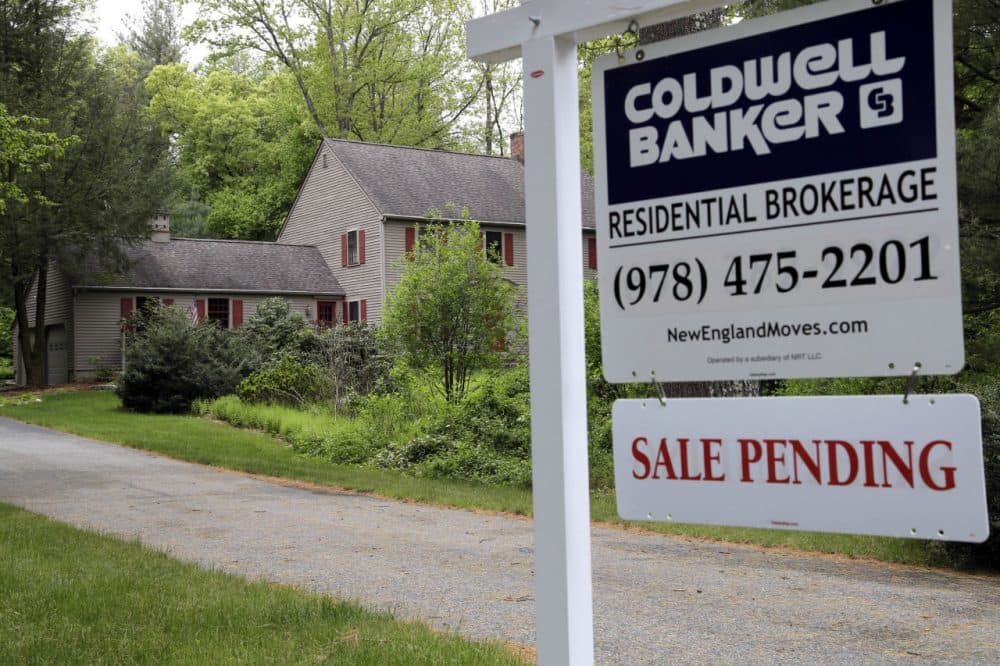Advertisement
To Solve State's Housing Inventory 'Crisis,' Advocates Say Liberalize Zoning

For North Shore real estate agent Amy Wallick, a hot housing market is usually a good thing. But when home prices are increasing far faster than wages, and the number of homes on the market declines each month, agents around Greater Boston say the hot market could do more harm than good.
"Buyers are getting exhausted," Wallick said. She's observed a summer slowdown on the North Shore after a spring that was unbearably competitive for some buyers.
Real estate experts attribute the historically expensive housing market in part to historically low inventory: In 76 of the last 77 months tracked by the Massachusetts Association of Realtors (MAR), the group has reported year-over-year declines in the number of homes for sale.
The inventory crunch has led to calls for cities and towns to modernize their zoning bylaws to allow for more housing, but an attempt to facilitate that process failed to make it through the state Legislature's formal session earlier this summer.
"The more restrictive the zoning is, the less inventory we are going to have," said Wallick, who's vice chair of the MAR's government affairs committee.
That’s why the group joined with other organizations to support Gov. Charlie Baker’s Housing Choice bill, unveiled in December of last year. The legislation would make it easier for municipal bodies to rezone districts to allow for greater housing production. Instead of the two-thirds supermajority vote now required under state law, a simple majority vote would be enough to make changes to local zoning bylaws.
Some say that threshold (to get a supermajority in a three-member body, for instance, there must be unanimity) is hindering housing production at the local level.
The simple majority proposal "would allow for more density in certain areas, to build more housing," Wallick said. "[It would be] a fantastic first step to solving this inventory crisis we have right now."
In Massachusetts in July, the number of closed single-family home sales was up 3.3 percent over the year, according to the MAR.
But more telling is the number of houses on the market, which was down more than 15 percent compared with July 2017, while prices were up 7.2 percent.
It's a supply-and-demand imbalance that analysts blame for soaring prices. Median single-family home prices in June hit a record high of $430,000, only to come down slightly in July.
The MAR says in a recent release that the market is causing worries of a housing bubble: "Wages are up but not at the same pace as home prices, leading to the kind of affordability concerns that can cause fewer sales at lower prices."

No one claims Baker’s plan would singlehandedly solve the inventory problem. But the bill — considered modest compared with more sweeping proposals to reform the state's zoning laws — failed to get through the Legislature by the end of the formal legislative session.
Now, housing advocates who see zoning as a key to addressing the inventory crisis are trying to figure out how to advance the bill.
Weighted To Favor The Status Quo
The supermajority zoning rule gives more say to those who want to keep things the same, and advocates for the current system say a simple majority would put too much power into the hands of voters.
Stephen O’Donnell, a lifelong Milton resident and chair of the town's historical commission, says the intransigence of zoning bylaws helps preserve the character of towns that make them attractive in the first place.
“If I wanted to live in an urban community, I would,” said O'Donnell. "I live in a suburban community and I want to protect what’s here."
O’Donnell said zoning changes that allow greater density do happen in Milton. He pointed to a development now under construction, the 36-unit Woodmere at Brush Hill, near Boston’s Hyde Park neighborhood, which was allowed because of a cluster zoning initiative that passed with a two-thirds majority at town meeting.
“Change is movement, no change is inertia, and it’s easier to leave things the same than to change them,” O’Donnell said. "Somebody’s got to come out and convince people that [change] is a good thing.”
But others say the need for more housing should outweigh desires to conserve the status quo.
“I think there’s no constitutional right to require a two-thirds vote,” said Jamaica Plain-based attorney Lawrence DiCara, a former Boston city councilor who specializes in real estate and government relations.
Advocates for the zoning change hope it will encourage more housing development in suburban communities around Greater Boston, particularly areas with access to public transportation.
DiCara said that could possibly take pressure off of Boston, but also the region’s post-industrial Gateway Cities, which together shoulder the brunt of the state's affordable housing. Advocates say the suburbs — particularly affluent towns close to the city like Milton and Newton — need to build more affordable housing.
“People who want to restrict housing in their community — and many have done so with great success for a long time — want to keep the two-thirds [rule],” DiCara said.
DiCara added: People other than “rich white people on two acres” want to change the zoning laws.
A Threat To The Economy
The zoning proposal is part of a broader package Baker promised would create 135,000 new units in the state. In December his office said Massachusetts home prices "have increased at the fastest rate in the nation." Baker later told the Joint Committee on Housing that the high cost of homes "poses the most serious long-term hurdle to continued economic growth."
Advocates point out that his proposal isn't about forcing zoning reform on local communities, as other initiatives seek to do. Instead it would allow the state's 351 cities and towns (except Boston, which has its own zoning system) to change their own rules, only it would lower the threshold for town meetings or city councils to make certain changes.
Advocates want to ease the way for innovative land uses that now run afoul of zoning rules, to be allowed "as of right" or by special permit.
For example, developers could be allowed to build houses closer together and on smaller lots, more multi-family housing could be built in town centers, and homeowners could create in-law apartments.
One town official familiar with the difficulty of zoning reform is Adam Chapdelaine, Arlington’s town manager. He recalls that in 2012, town officials wanted to change the zoning so people could build a single “accessory dwelling unit” (ADU) inside single-family homes, whether for use as a “granny flat" or to rent. Not only would that allow people to stay in their homes longer and keep rent money in the pockets of local homeowners, advocates say more ADUs could go a long way toward addressing the housing shortfall.
For Chapdelaine it was a no-brainer, but the effort failed to get even a simple majority.
“The whole idea of a granny flat makes a lot of sense,” he said. "I think it would open up possibilities for young families to buy a home … and make [more feasible] the whole idea of both affording a home in Arlington, and possibly having two parents working.”
Chapdelaine said simplifying the rezoning process could facilitate future changes he plans to present in Arlington. But he says the town will have to do a better job explaining to voters how they would benefit from the change.
Status Quo Prevails
A broad coalition formed to support the governor's legislation, from the Smart Growth Alliance to the Massachusetts Municipal Association (MMA), both of which admit they don’t always see eye-to-eye.
Andre LeRoux, executive director of the alliance, points out that lawmakers last session were able to pass a $1.8 billion housing bond bill, the largest in state history. But without structural reforms, he says government spending can only do so much.
“No matter how much public money we invest in building housing, that’s going to be a drop in the bucket compared to the overall housing market,” LeRoux said. "That’s why we need zoning reform, because [it] will also unlock the private market to help solve the problem.”
The MMA’s Geoff Beckwith says several communities have been trying to update their zoning to allow for more housing, but it’s tough to muster a two-thirds vote.
"We agree with the governor that this would have created thousands and thousands of additional units of housing," Beckwith said, "and it would’ve done so in a way that was responsive to differences between communities.”
Advocates describe the Housing Choice legislation as a compromise bill — halfway between the points of doing nothing, and a comprehensive zoning reform effort that passed in the Senate but languished in the more conservative House. It remains "under review" in the House Ways & Means Committee.
With so many groups on board with, why couldn't it get passed into law? Some say it was the influence of legislators representing NIMBY (not-in-my-backyard) sentiment in their districts. Others say legislators were concerned about who would get credit during an election year.
But Rep. Jeffrey Sanchez, chairman of the Ways & Means Committee and a key ally of the speaker, said the measure enjoyed wide support in the House. Sanchez said interests looking to amend the bill with contentious provisions ended up being its downfall.
"What happened through the process was a number of the advocacy groups, they literally added on 10 or 12 other things to the list," Sanchez said in a phone interview. "That’s where we’re stuck.”
Again, the status quo prevailed.
LeRoux, of the Smart Growth Alliance, said the group's intention was to find common ground between the governor's bill and the earlier zoning reform bill that withered in the House.
"We're an easy scapegoat but it's up to the Legislature to make decisions, not advocates," LeRoux wrote in a text. "We've been crystal clear that we wanted something to get done and were flexible about what it looked like."
'Often It Takes Several Runs'
Zoning reform "is a very complicated area, and often it takes several runs,” the MMA's Beckwith said. “We’re hopeful the more people see this and talk about it, the more support it will have."
As for Baker, he expressed optimism at a recent groundbreaking ceremony in Plymouth, after the House finished up the legislative season without acting on zoning.
"[Our plan] got the support of the realtors, the homebuilders, the land use folks, the local officials, the planning folks and the environmentalists,” Baker said, according to a transcript from his office. “Our hope is we can get the bill done before the end of the session. We were hoping to do it in the formal, now we’re hoping to do it in the informal [session]."
Rep. Sanchez — a Boston Democrat who's campaigning to hold on to his seat ahead of the upcoming primaries — says he's also optimistic it will happen next year.
As for a wider look at zoning reform in the next Legislature? Now that's complicated.
